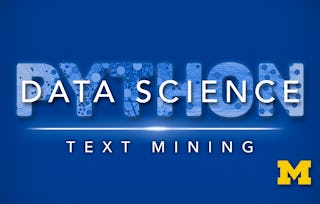This course will cover the major techniques for mining and analyzing text data to discover interesting patterns, extract useful knowledge, and support decision making, with an emphasis on statistical approaches that can be generally applied to arbitrary text data in any natural language with no or minimum human effort.

Text Mining and Analytics

Text Mining and Analytics
This course is part of Data Mining Specialization

Instructor: ChengXiang Zhai
74,356 already enrolled
Included with
737 reviews
Skills you'll gain
Details to know

Add to your LinkedIn profile
14 assignments
See how employees at top companies are mastering in-demand skills

Build your subject-matter expertise
- Learn new concepts from industry experts
- Gain a foundational understanding of a subject or tool
- Develop job-relevant skills with hands-on projects
- Earn a shareable career certificate

There are 7 modules in this course
You will become familiar with the course, your classmates, and our learning environment. The orientation will also help you obtain the technical skills required for the course.
What's included
2 videos5 readings2 assignments1 plugin
During this module, you will learn the overall course design, an overview of natural language processing techniques and text representation, which are the foundation for all kinds of text-mining applications, and word association mining with a particular focus on mining one of the two basic forms of word associations (i.e., paradigmatic relations).
What's included
9 videos1 reading2 assignments
During this module, you will learn more about word association mining with a particular focus on mining the other basic form of word association (i.e., syntagmatic relations), and start learning topic analysis with a focus on techniques for mining one topic from text.
What's included
10 videos1 reading2 assignments
During this module, you will learn topic analysis in depth, including mixture models and how they work, Expectation-Maximization (EM) algorithm and how it can be used to estimate parameters of a mixture model, the basic topic model, Probabilistic Latent Semantic Analysis (PLSA), and how Latent Dirichlet Allocation (LDA) extends PLSA.
What's included
10 videos2 readings2 assignments1 programming assignment
During this module, you will learn text clustering, including the basic concepts, main clustering techniques, including probabilistic approaches and similarity-based approaches, and how to evaluate text clustering. You will also start learning text categorization, which is related to text clustering, but with pre-defined categories that can be viewed as pre-defining clusters.
What's included
9 videos1 reading2 assignments
During this module, you will continue learning about various methods for text categorization, including multiple methods classified under discriminative classifiers, and you will also learn sentiment analysis and opinion mining, including a detailed introduction to a particular technique for sentiment classification (i.e., ordinal regression).
What's included
7 videos1 reading2 assignments
During this module, you will continue learning about sentiment analysis and opinion mining with a focus on Latent Aspect Rating Analysis (LARA), and you will learn about techniques for joint mining of text and non-text data, including contextual text mining techniques for analyzing topics in text in association with various context information such as time, location, authors, and sources of data. You will also see a summary of the entire course.
What's included
8 videos1 reading2 assignments1 plugin
Earn a career certificate
Add this credential to your LinkedIn profile, resume, or CV. Share it on social media and in your performance review.
Instructor

Offered by
Explore more from Data Analysis
 Status: Preview
Status: PreviewYonsei University
 Status: Free Trial
Status: Free TrialO.P. Jindal Global University
 Status: Free Trial
Status: Free TrialUniversity of Illinois Urbana-Champaign
 Status: Free Trial
Status: Free TrialUniversity of Michigan
Why people choose Coursera for their career

Felipe M.

Jennifer J.

Larry W.

Chaitanya A.
Learner reviews
- 5 stars
68.52%
- 4 stars
20.21%
- 3 stars
7.59%
- 2 stars
2.03%
- 1 star
1.62%
Showing 3 of 737
Reviewed on Jul 22, 2017
The workflow is clear and the professor speaks to the students directly about all aspects without skimming the material.
Reviewed on Mar 24, 2018
The content of Text Mining and Analytics is very comprehensive and deep. More practise about how formula works would be better. Quiz could be not tough to be completed after attending every lectures.
Reviewed on Mar 11, 2022
Very difficult, especially when it comes to logic and using math equations. You'll have a lot to learn from this course.

Open new doors with Coursera Plus
Unlimited access to 10,000+ world-class courses, hands-on projects, and job-ready certificate programs - all included in your subscription
Advance your career with an online degree
Earn a degree from world-class universities - 100% online
Join over 3,400 global companies that choose Coursera for Business
Upskill your employees to excel in the digital economy
Frequently asked questions
To access the course materials, assignments and to earn a Certificate, you will need to purchase the Certificate experience when you enroll in a course. You can try a Free Trial instead, or apply for Financial Aid. The course may offer 'Full Course, No Certificate' instead. This option lets you see all course materials, submit required assessments, and get a final grade. This also means that you will not be able to purchase a Certificate experience.
When you enroll in the course, you get access to all of the courses in the Specialization, and you earn a certificate when you complete the work. Your electronic Certificate will be added to your Accomplishments page - from there, you can print your Certificate or add it to your LinkedIn profile.
Yes. In select learning programs, you can apply for financial aid or a scholarship if you can’t afford the enrollment fee. If fin aid or scholarship is available for your learning program selection, you’ll find a link to apply on the description page.
More questions
Financial aid available,

